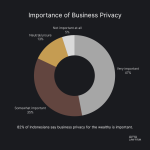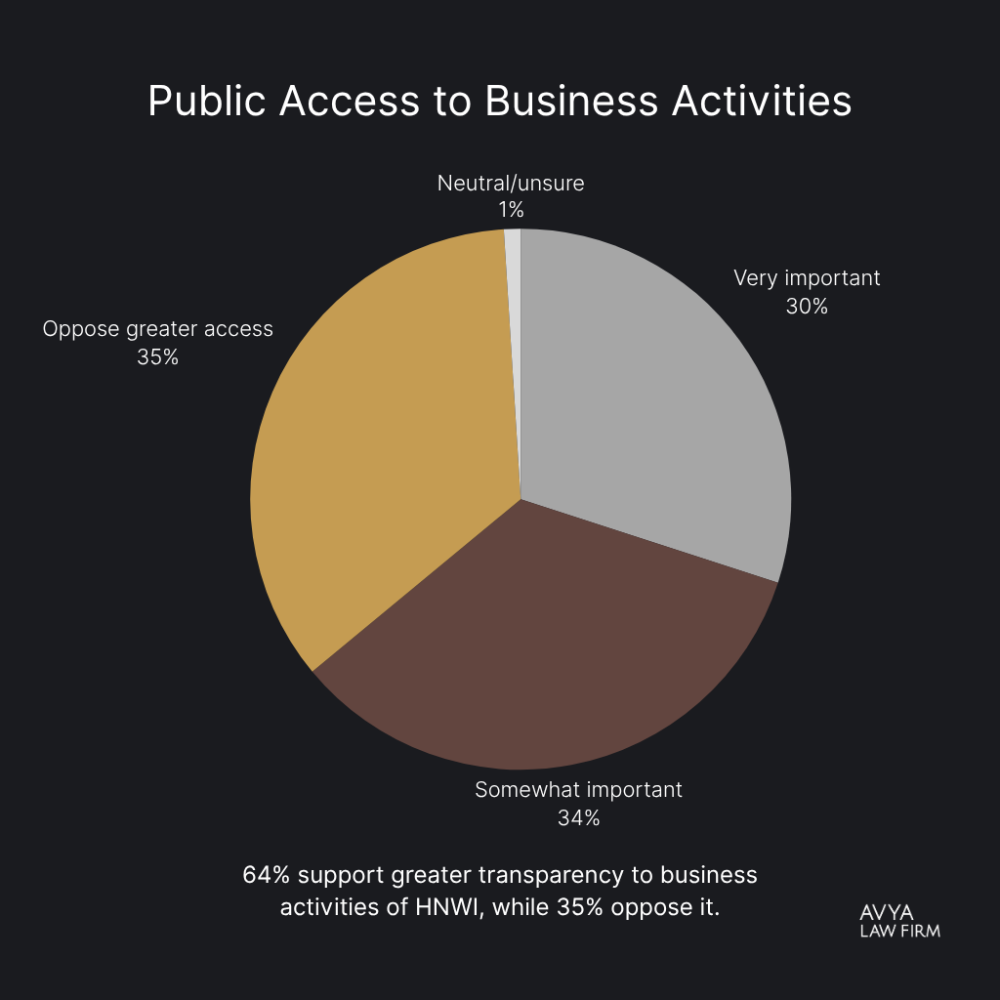High-net-worth individuals (HNWIs) and families in Indonesia often face a dual challenge: safeguarding their right to privacy while responding to growing public expectations for transparency.
To better understand these attitudes, AVYA Law Firm, in collaboration with Farrant Group, the reputation management firm, conducted a survey of 100 respondents across major Indonesian cities. The results reveal a nuanced and sometimes contradictory set of views, providing valuable insight for family offices, advisors, policymakers, and HNW families themselves.
The Privacy–Transparency Paradox
A striking majority of respondents (82%) say HNW business privacy is important, with nearly half (47%) rating it as very important. Only 5% considered it unimportant. Yet, at the same time, 64% of the very same group believe the public should still have access to the business activities of wealthy individuals and families.

This paradox highlights a central theme: Indonesians want to protect privacy credibly while still ensuring a level of visibility and accountability.
Equal Rights and Privacy Tools Enjoy Strong Support
Beyond the paradox of valuing both privacy and visibility, Indonesians also express strong principles about fairness and practicality.
The survey highlights that respondents want privacy to be treated as a universal right, not a privilege tied to wealth, while also recognizing the legitimacy of tools that allow families to protect their sensitive information.
- 81% of respondents agree that HNW families deserve the same privacy rights as everyone else.
- 80% believe the use of privacy-preserving tools (such as legal and technological mechanisms) is reasonable.
This suggests Indonesians recognize privacy as a universal right, while still acknowledging that wealthy families may need additional structures to safeguard it.
Generational and Sector Nuances
While overall support for privacy is strong, the data shows important differences across age groups and professional sectors. These nuances matter because they shape how expectations around privacy and transparency may evolve in the coming years.
Younger Indonesians Lead on Privacy
Respondents aged 21–35 are the most privacy-protective group:
- 52% rate HNW business privacy as very important.
- 54% express sympathy for privacy challenges faced by HNW families.
This generational finding signals that next-gen wealth holders and their advisors will expect privacy-by-design solutions; structures and governance frameworks that protect confidentiality without ignoring disclosure norms.
Public Sector vs Private Sector Perspectives
Across all professions, support for privacy is consistently high. However, public sector respondents stand out:
- 91% support the use of privacy tools.
- 54% favor greater openness around HNW activities.
By contrast, private sector and self-employed respondents are less supportive of “greater openness,” with 43% and 47% respectively disagreeing.

These sectoral differences suggest that public institutions may push for governance approaches that emphasize both confidentiality and transparency, while private actors may prefer to limit openness.
Implications for HNW Families, Advisors, and Policymakers
Taken together, the findings point to clear opportunities—and responsibilities—for those engaged with private wealth in Indonesia. Each stakeholder group faces distinct implications.
- For HNW families & family offices: The survey provides social license to adopt robust privacy protections, but there remains a clear expectation of reasonable transparency around business activities.
- For advisors: Younger generations and public sector stakeholders will increasingly demand confidentiality measures that balance privacy with accountability.
- For policymakers & media: The public recognizes both the legitimacy of privacy tools and the importance of access to information, highlighting the need for nuanced regulation.
These insights reinforce that privacy is not simply a personal preference but a matter of governance and trust in the broader system.
Methodology in Brief
The survey collected responses from 100 qualified participants across Indonesia’s major cities, all with at least a high-school diploma. Recruitment applied strict anti-fraud safeguards. Respondents’ primary sources of information were social media (65%), Indonesian news outlets (26%), and international news (21%).
The AVYA Law Firm x Farrant Group survey shows that Indonesians do not see privacy and transparency as mutually exclusive. Instead, they call for a balance: strong privacy protections paired with meaningful visibility into wealth and business conduct.
For families of significant wealth—and those who advise or regulate them—the path forward lies not in choosing one side, but in designing governance frameworks that respect both.
Disclaimer
The findings presented here are descriptive of survey responses only. This publication does not endorse, justify, or oppose any particular view regarding individuals or families with significant wealth. The purpose of this survey is solely to capture and present public attitudes in Indonesia toward issues of privacy and transparency. The results should be understood as a reflection of respondent perspectives at the time of data collection, not as policy recommendations or normative judgments. Any interpretation beyond the presentation of data lies entirely with the reader.
|
Survey Partner Victor Haggard Senior Account Director at Farrant Group |
AVYA Law Firm – Contact Alldo Fellix Januardy Managing Partner |
